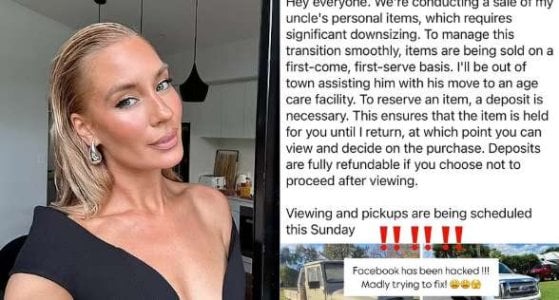Keep your accounts safe! Content creator unravels scam targeting social media users
By
Danielle F.
- Replies 22
In today's digital age, convenience and accessibility have become king for many.
However, no one is safe from the ever-evolving tricks of online scammers.
This week, an online content creator found herself at the centre of a social media nightmare and wants to warn Aussies about the prevalent scheme.
Jamie Reilly, a stylist and model from Adelaide, panicked on social media after her discovery.
The 38-year-old online content creator found out that fraudsters had hijacked her Facebook account.
'Facebook has been hacked!!! Madly trying to fix it,' Reilly posted on social media.
The hackers wasted no time and used her profile to post a suspicious 'clearance sale'.
She posted the fraudulent ad on her social media accounts, hoping to reach as many people as possible before anyone got duped out of their money.
Reilly's ordeal began with a heart-tugging tale about an 'uncle' moving into aged care.
The scammers prompted a quick-fire sale of vehicles and equipment, which included a Land Cruiser worth $10,000, a $2,800 golf cart, and a $28,000 Ford F-150.
All the buyer had to do was to send a 'fully refundable' deposit to secure the items.
The scam post that targeted Reilly was detailed, with scheduled 'viewings and pick-ups' set for a later date.
Scammers often create a sense of urgency and tug at victims' heartstrings to lure them in.
Unfortunately, these tactics work often, especially when the message comes from a trusted friend or public figure.
Jamie, who was married to AFL Crows's Brent Reilly, was not the first Aussie celebrity to be targeted.
Earlier this year, TV star Larry Emdur found his image splashed across fake news stories online.
Scammers used his face and credibility to lure unsuspecting readers to dodgy websites.
While Larry poked fun at the situation, he also reminded his fans to steer clear of suspicious links and too-good-to-be-true offers.
Many Australians use Facebook to keep in touch with family, share photos, and stay updated with current events.
However, social media, in general, has been a goldmine of information for scammers.
With just a few clicks, they could access victims' friends lists, personal information, and even private messages.
Once scammers have taken over an account, they could impersonate the user, spread scams, and trick the victims' friends and family into handing over money.
For seniors, these scams can be particularly devastating.
Here are some practical tips to keep your social media accounts safe:
By staying vigilant, using strong security measures, and looking out for each other, everyone can help keep online communities safe.

Have you or someone you know ever been targeted by a similar social media scam? What steps do you take to protect your social media (or SDC) accounts? Share your stories and tips in the comments below.
However, no one is safe from the ever-evolving tricks of online scammers.
This week, an online content creator found herself at the centre of a social media nightmare and wants to warn Aussies about the prevalent scheme.
Jamie Reilly, a stylist and model from Adelaide, panicked on social media after her discovery.
The 38-year-old online content creator found out that fraudsters had hijacked her Facebook account.
'Facebook has been hacked!!! Madly trying to fix it,' Reilly posted on social media.
The hackers wasted no time and used her profile to post a suspicious 'clearance sale'.
She posted the fraudulent ad on her social media accounts, hoping to reach as many people as possible before anyone got duped out of their money.
Reilly's ordeal began with a heart-tugging tale about an 'uncle' moving into aged care.
The scammers prompted a quick-fire sale of vehicles and equipment, which included a Land Cruiser worth $10,000, a $2,800 golf cart, and a $28,000 Ford F-150.
All the buyer had to do was to send a 'fully refundable' deposit to secure the items.
The scam post that targeted Reilly was detailed, with scheduled 'viewings and pick-ups' set for a later date.
Scammers often create a sense of urgency and tug at victims' heartstrings to lure them in.
Unfortunately, these tactics work often, especially when the message comes from a trusted friend or public figure.
Jamie, who was married to AFL Crows's Brent Reilly, was not the first Aussie celebrity to be targeted.
Earlier this year, TV star Larry Emdur found his image splashed across fake news stories online.
Scammers used his face and credibility to lure unsuspecting readers to dodgy websites.
While Larry poked fun at the situation, he also reminded his fans to steer clear of suspicious links and too-good-to-be-true offers.
Many Australians use Facebook to keep in touch with family, share photos, and stay updated with current events.
However, social media, in general, has been a goldmine of information for scammers.
With just a few clicks, they could access victims' friends lists, personal information, and even private messages.
Once scammers have taken over an account, they could impersonate the user, spread scams, and trick the victims' friends and family into handing over money.
For seniors, these scams can be particularly devastating.
Here are some practical tips to keep your social media accounts safe:
- Use strong passwords: Don't use the same password for Facebook, Instagram, and your email. If one account is compromised, the rest could follow.
- Enable two-factor authentication (2FA): This adds an extra layer of security by requiring a code to be sent to your phone or email whenever you log in from a new device.
- Be wary of unusual messages: If a friend suddenly asks for money or starts selling expensive items, double-check by contacting them through another method.
- Check for spelling and grammatical errors: Scammers often make mistakes in their posts or messages.
- Don't click suspicious links: If something seems off, don't click! Go directly to the official website or contact the person through another channel.
- Regularly review privacy settings: Make sure you know who can see your posts and personal information.
- Change your password immediately.
- Report the hack to the social media platform.
- Let your friends and family know you've been hacked, and warn them not to interact with suspicious posts or messages.
- If you've lost money, contact your bank and report the scam to the ACCC's Scamwatch.
By staying vigilant, using strong security measures, and looking out for each other, everyone can help keep online communities safe.
Key Takeaways
- Online content creator Jamie Reilly warned her followers after scammers hacked her Facebook account.
- The con artists used a made-up story about an uncle moving into aged care to make their scam seem more believable.
- Victims were asked to pay hefty deposits for vehicles, with scammers promising full refunds.
- The article highlighted similar scams, including fake news stories using celebrity images, reminding Aussies to be cautious online.








